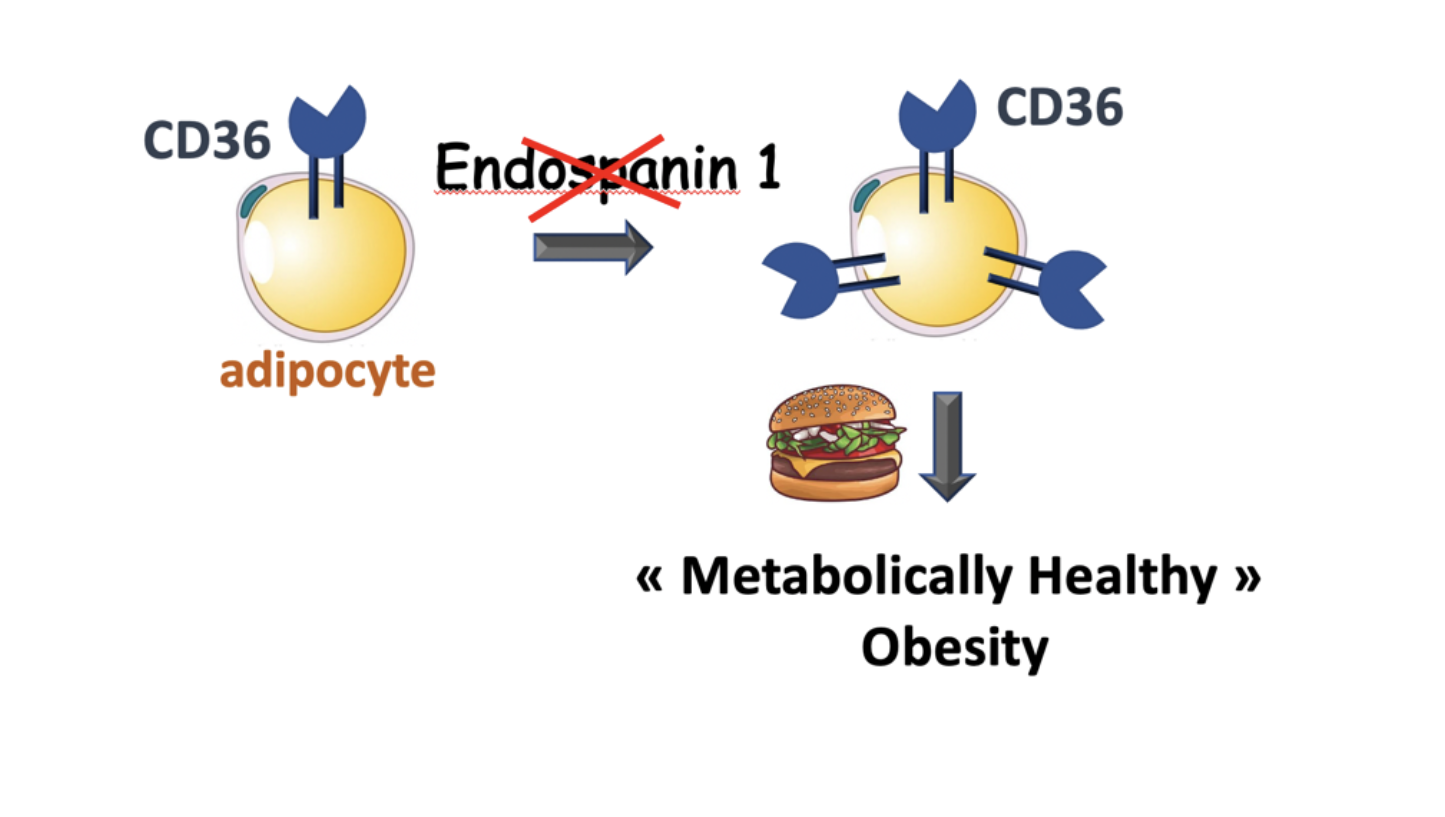The absence of Endospanin 1 protein expression protects against harmful alterations associated with obesity
"A study conducted by the team “Functional Pharmacology and Pathophysiology of Membrane Receptors” suggests that preferentially favoring lipid uptake in adipocytes can limit the alterations associated with obesity induced by a high-fat diet, and promote a "metabolically healthier" obesity. This is dependent on a protein called Endospanin 1, which controls the cellular localization of the lipid transporter CD36. This work is published in the journal JCI Insight."
The study highlights two important concepts: the importance of receptor localization at the cell surface and the notion of “metabolically healthy” obesity. These concepts are linked by a protein called 'Endospanin 1' (also known as Leprot or OBRGRP).
Obesity is a crucial research topic in Europe, addressed by the European Union's research and innovation programs (Horizon Europe). Obesity is a condition that often causes health problems, such as steatosis (accumulation of fat in the liver), type 2 diabetes, and low-grade chronic inflammation, leading to cancers and cardiovascular diseases. However, some individuals with obesity do not necessarily develop metabolic disorders, highlighting the notion of “metabolically healthy obesity”, whose existence is controversial and mechanisms are unclear.
CD36, which has attracted much attention, is a pleiotropic receptor initially described as a lipid-binding receptor and is primarily known for its role in lipid transport in adipose tissue, particularly in fat cells called “adipocytes”. Usually, the overall amount of this protein or its messenger RNA is measured to monitor its function, but its exact localization within the cell is not always taken into account.
The current work reveals that the trafficking protein, Endospanin 1, regulates the amount of CD36 on the surface of fat cells. In the absence of Endospanin 1, levels of CD36 receptor are increased at the surface of adipocytes, which promotes fat absorption by adipocytes and thus prevents the deleterious accumulation of fat in other organs. In line with these observations, mice deleted for Endospanin 1, fed a high-fat diet, develop obesity but with fewer health problems (better glucose tolerance, less fat in the liver, less inflammation, better insulin sensitivity). Interestingly, this correlation has also been observed in humans, suggesting that a low level of Endospanin 1 may help promote “metabolically healthy” obesity in humans.
The study highlights the importance of evaluating the levels of receptors and transmembrane proteins on the surface of cells, a variable often underestimated but which can have significant consequences in pathology. Research on the underlying molecular mechanisms of obesity and its metabolic alterations remains an important area of investigation. It is essential for understanding the disease, developing effective prevention and treatment strategies, improving public health, and reducing the economic and social impacts related to overweight and obesity.
Reference :
Roca-Rivada A, Do Cruzeiro M, Denis RG, Zhang Q, Rouault C, Rouillé Y, Launay JM, Cruciani-Guglielmacci C, Mattot V, Clément K, Jockers R, Dam J. Whole-body deletion of Endospanin 1 protects from obesity-associated deleterious metabolic alterations. JCI Insight. 2024 Apr 2;9(9):e168418. doi: 10.1172/jci.insight.168418.
https://insight.jci.org/articles/view/168418
The study was funded by:
European Union's Seventh Framework Programme (FP7/2007-2013) under grant agreement n° 241592 and from the European Union’s Horizon Europe Research and Innovation Program under grant agreement 101080465 (OBELISK project), by the Agence Nationale de la Recherche ANR-12-JSV1-0011, ANR-15-CE14-0025, ANR-21-CE14-0041, Department Hospitalo Universitaire (DHU) AUTHORS, Fondation pour la recherche medicale, Institut National de la Santé et de la Recherche Médicale (INSERM), Centre National de la Recherche Scientifique (CNRS).
This work was led by Drs Julie DAM / Ralf Jockers Team, INSERM, Institut COCHIN.
Contact :
- Hits: 784

